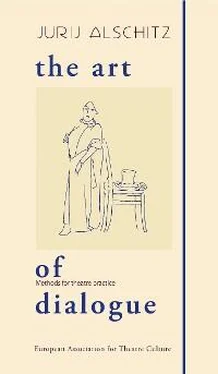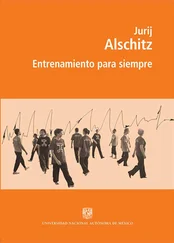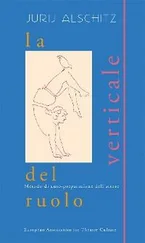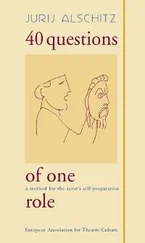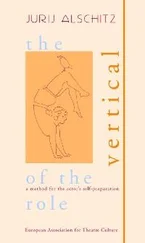Each dialogue incubates a powerful Question like a germ cell. We need to find it. It relates to each character, each actor and each person. This question is directed at you as actor, it is addressed to you as an individual, and that in turn provokes the character who you are playing. In a dialogue the question must be “distributed to all addresses”.
But first the actor must find the question and define it. This is not easy at all, because the question can come under different names and in different masks. You might not even understand that it is this Question which will transform you or your Dialogue. It depends on your alertness, your experience, and your skill-level of analysis. You need training. For this, take dialogues by different authors and try to find the main question in each of those dialogues. You will find that the question can come too early in your dialogue when it is not yet your turn, according to your role. Or the role has already started but you are not prepared to articulate the question out loud. In this case, the question is present in the dialogue, just waiting for its entrance. It can also happen that the question appears later, meaning the answer was already played before the question was even articulated. Such a reversal between question and answer is always very interesting. Arrivals of the question “early” or “late” in the composition of a dialogue always create a playful and meaningful tension in the scene. Such a device protects the dialogue from the catechism of the question-and-answer pattern. The questions come and go, they can appear again and be repeated in other scenes, they can be split in two or three parts and so on, until they have been fully articulated. But note this, too: it is far from being the case that you and your character always give birth to the questions. That’s an illusion. Questions are born of themselves.
The Question which comes at an unplanned time, not in the situation or place where people are prepared for it, gives rise to genuine shock. Suddenly!!! It appears unexpectedly and nobody can find anywhere to hide from it. Actors need to search for such questions, more than anything. These are the so-called event-Questions, questions which turn everything on its head. They live their own special life – they are born, they live and they die. I’m saying this so that the actor shouldn’t be too satisfied by the fact of the arrival of an important question, during an analysis; he is going to have to follow the whole journey of its life. Questions have their own complicated lives: some short, some long. The process of forming, and giving birth to, the question must become an important, composite part of the actor’s and director’s analysis of the whole dialogue. I personally like these explosion-like questions. Nobody is waiting something – and suddenly – an explosion. This is preceded by a long energetic tension, which creates the conditions for this bolt out of the blue. Such a question wakes up everyone and everything. It turns the dialogue on its head. We are speaking about a nice theme, eating an apple, talking to animals, nothing presages change and then – suddenly!!! An explosion-question – and everything changes. Like this ignition, from the outside – “Where are you?” – the Lord explodes the inner cosmos of Adam, destroying his original wholeness. An explosion is always effective but, at the same time, it’s important not to forget that the aim of such an explosion-question is not to destroy! We don’t need such a question in dialogue for that – it’s not in order to kill, overturn, conquer, confirm, subordinate, and so on. The destruction of the prepared, the about-turn, the explosion of the whole: these should be realised as a launch of energy for creation and rebirth. This is what is intended with the question; that’s what we need.
In a play, the dialogue begins from the question. That’s the way it is. But that does not mean you will always see it immediately in your role, in the text. Even there’s no question mark in the first line, or second or third, the actor still needs to hear it, and play it. There is always a question in the beginning, even if nobody has formulated it on paper. Notice that a question can stand in front of the door for a long time. The question might have started its life long time before it appears in the dialogue and formulates itself. Sometimes, it takes time for it to be formulated, to dress itself correctly before it can decide to come in and introduce itself. It is the job of the actor to listen for it when it’s still outside the door, to see it before it comes in, not only if it’s standing right in front of you. That’s too late. Then, only an elementary reaction will occur, a hasty judgement, but not the process of a genuine meeting. For me dialogues, which are full of such quick-fire judgements and reactions, are on the lowest rung of acting. “Suddenly!” and “Explosion!” do not mean you need to scream or duck under the table.
On Stage, the dialogue begins from the question. That’s the way it is. But, hang on, your partner asks the fundamental question and you don’t even hear it or feel it. Does that mean it’s not a question? Well, sometimes the question is nothing but words from your partner, just lines of text, and so you don’t recognise it. The actor asking the question must, first of all, hear the question which he’s asking deeply inside himself, and understand its depth and perspective. Why should he ask if it’s not important to him? If the person asking does not highly value what he is asking, if the question is only for the other but not for himself, then this Question will never be uncovered.
I value questions – those wise, old beings which were born even before the plays. These are the timeless questions. They were alive before the dialogue and the play, and they have a long life ahead of them, even after the dialogue. The actor must learn, while still in the analysis, to hear them and differentiate them from ephemeral questions. A long-borne question, which has aged like a fine wine, has a different, particular weight, a different energy. This kind of question decides for itself when to appear, before you can decide whether to ask it now or later. It’s the same way a child – not the doctor or midwife – decides when to be born onto god’s earth.
So look how beautiful it sounds when scenes, plays or dialogues begin with such a powerful question as, for example, in Plato:
“Welcome, Ion. From where do you wander in this moment? I assume, from your house of Ephesus?” 7
or in Shakespeare:
“When shall we three meet again In thunder, lightning, or in rain?” 8
In Pushkin:
“What do you think? Could I be recognised?” 9
Or in Chekhov
“Why are you always in black?” 10
The fact that it’s not a common question but a question which sets in motion the machine of dialogue means you will always hear it and feel it like an impulsive, germinating burst of energy. It is always experienced vividly, almost painfully. Disturbingly and joyfully, it includes you in the dialogue. Everything is in it – in the first question, just as the first step of a marathon contains the energy for the whole forty two kilometers and one hundred and ninety five meters.
In dialogue, there can be arsonist-questions which, like sparks, ignite first one question then another, until the whole theme is alight, the whole Person. The questions themselves aren’t powerful, not dangerous individually, as it were; they are just matches. Perhaps one does not even notice them. But together, – they give birth to flames. It is exactly this creative flame, which begins the process of the birth of the Individual, Adam. Notice how – with his quasi-innocent question “Where are you?” – God changes his conception of the living being-Person, created out of the dust of the earth, into a Person-individual, created out of questions and answers. Questions and answers – that is the main material from which the Person-individual is created: they torture us, fill us with hopelessness, reassure us, please and kill us; other questions are born – in brief, they make us living personalities. We were not simply thrown out of Heaven. No, we were condemned to a constant search for answers and the birth of new questions which are looking for their answers. An endless inner dialogue was started in us, with a constant insane search for answers in the labyrinth of questions. What is it? Why is this? What is it good for? To make you search. To search for your times, your place and your world. And most importantly to search for yourself, your Personality, your Wholeness. In life, it is this unending search for wholeness which makes a person into an individual. In theatre, it is this search which makes a character into a personnage. And one must understand the main movement of a dialogue as a search.
Читать дальше
